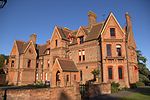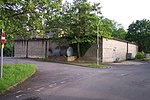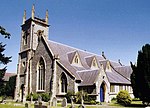University of Reading Herbarium
Herbaria in the United KingdomUnited Kingdom museum stubsUniversity of Reading
The University of Reading Herbarium (RNG) is a herbarium on the University of Reading's Whiteknights Campus. Along with the Cole Museum, it forms part of the university's School of Biological Sciences, and is principally used for teaching and research purposes. The herbarium has over 400,000 specimens from around the world but has its most extensive collections from the Euromediterranean area, supplemented with special collections from the Falkland Islands and southern South America. The herbarium provides a research resource for some 50 staff and 500 students in Biological Sciences as well as providing material via loans to other registered herbaria.
Excerpt from the Wikipedia article University of Reading Herbarium (License: CC BY-SA 3.0, Authors).University of Reading Herbarium
Wilderness Road,
Geographical coordinates (GPS) Address Website Nearby Places Show on map
Geographical coordinates (GPS)
| Latitude | Longitude |
|---|---|
| N 51.437633333333 ° | E -0.94193888888889 ° |
Address
University of Reading Whiteknights Campus
Wilderness Road
RG6 7RR , Lower Earley
England, United Kingdom
Open on Google Maps









